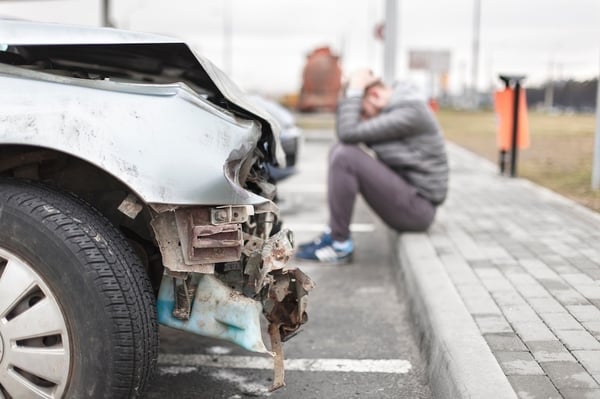Car accidents can happen out of nowhere.
You're on your way to work, taking the kids to school or grabbing dinner for the family, and then boom; you get t-boned, rear-ended, or blindsided by someone not paying attention.
Luckily many car accidents are fender benders that happen at low speeds in places like parking lots or small side streets.
In accidents like that injuries are rare, but still possible.
Even in some major accidents, you see people walking around like nothing's happened.
Sometimes they'll have blood running down there face, arm or another extremity, so they know for sure they've been injured.
Other times, though, there is no sign of any injury, and the victim walks around like they're some kind of superhero that can't feel any pain.
There's a good chance they've been injured; they just can't feel it yet.
These are called delayed injuries, and they are very common in car accidents.
Call accidents are always stressful. However, things are made even more complicated when you don't even know who the person responsible is. Read our blog post: "How to Protect Yourself After a Hit and Run Accident."
In the article below, we will talk about why people have delayed injuries after car accidents, and what symptoms to look out for.
Table of Contents
- Why Car Accident Injuries Are Delayed
- Look Out For These Delayed Injury Symptoms
- Soft Tissue Injuries
- Other Symptoms To Look Out For
- How Delayed Injuries Affect A Personal Injury Case
Why Car Accident Injuries Are Delayed
If you're ever involved in a car accident, you will definitely feel the impact, especially if it is somewhat major.
However, the shock of the crash might temporarily mask any pain or discomfort you feel.
As your adrenaline kicks in after the accident, you might feel energized and angry, rather than feel the physical impact of the accident.
That burst of adrenaline and energy can carry you throughout the aftermath of the accident while you deal with the other driver, the police, the two truck, or even a responding EMT.
Sometimes you might refuse medical attention because you feel fine and insist you weren't injured.
That's often a mistake, and you should always seek medical treatment because whether it's a few hours or days after the accident, you will start to feel the effects of the accident.
The rush of adrenaline won't last forever, and you will finally start to feel the pain caused by the accident.
We discuss 5 common delayed car accident injuries in our blog post here.

Look Out For These Delayed Symptoms
Symptoms of serious injuries can hide for days after a car crash as you get over the shock and allow yourself to relax and process what happened.
One common car accident injury that might not be symptomatic immediately is a concussion.
A concussion is a brain injury that's caused by a direct blow to the head or a sudden jolt to the head or body.
In a car accident, even an impact at low speeds can shake your body enough to cause a concussion which can affect your cognitive functioning, usually temporarily.
A few symptoms of concussions that might not emerge until several days after the accident are:
- Trouble sleeping
- Inability to concentrate
- Trouble remembering things
- Changes in personality
- Headaches
- Blurry vision
- Dizziness
- Nausea
You should always be assessed for a concussion immediately after a car accident, even if you feel fine in that moment.
The earlier your concussion is diagnosed, the sooner treatment can begin, and the better your chances of a full recovery are.
Even if you are cleared after the accident, if you develop some of these symptoms over the following days, you should be reevaluated to be sure there's no concussion.
Soft Tissue Injuries
Another common car accident injury is a soft tissue injury like whiplash.
Soften tissues injuries typically take several days to become symptomatic because it takes time for swelling and stiffness to develop following a strain of a muscle or ligament.
Common symptoms of soft tissue injuries are:
- Back pain
- Shoulder pain
- Numbness in hands or feet
- Neck stiffness
- Swelling
- Loss of range of motion
Soft tissues injuries can be difficult to diagnose because they don't appear on x-rays or other imaging tests.
A doctor will assess your range of motion and evaluate hour symptoms to determine if you have whiplash or another soft tissue injury.
Other Symptoms To Look Out For
There are a few other signs of serious injury that you need to be aware of following a car accident.
The first is any abdominal pain or swelling. This can indicate that there is some internal bleeding caused by the seat belt or contact with another part of the car.
Any large areas of bruising, dizziness or fainting are also signs of internal bleeding.
Although it might take several days to notice, this is a serious and life-threatening condition that requires emergency treatment as soon as the symptoms are apparent.
Another symptom most people never think about is nightmares or flashbacks.
These are key indicators of PTSD.
If you experience disturbing and vivid memories of the event, you should see a doctor to be evaluated for PTSD.
Children involved in car accidents are particularly susceptible to PTSD.
Another sign of PTSD is the fear of getting back in your car and driving again.
Everybody wants to get on with their life after a car accident, but ignoring the signs that you have a delayed injury will set you back even further, and could be life-threatening.

How Delayed Injuries Affect A Personal Injury Case
Every decent car accident attorney will tell you never to say you weren't injured at the scene of the crash, and for good reason.
As we've just found out, you could be injured without knowing it.
However, it's even more important that you don't say that because of how it can affect your personal injury case.
You also shouldn't settle your claim or sign a release of liability with the at-fault driver's insurance company.
With the help of an attorney, it's possible to retract statements you made at the scene of the accident, but it's practically impossible to undo a release of liability.
When you're in a car accident, whether you think you're injured or not, you need to see a chiropractor, and you need to hire a personal injury attorney.
Chiropractors excel at treating soft tissue injuries that lay dormant after car accidents, and your personal injury attorney will help you navigate the legal system.
The team at the Car Wreck Doctor can connect you with both.
Car Wreck Doctor connects you with chiropractors and Personal Injury Attorneys that are trusted in your local area.
To see how Car Wreck Doctor can help you, click the button below.

